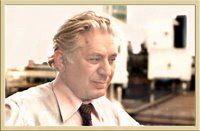News of Iranian Writer
اخبار من الکتاب العرب
Wednesday, May 03, 2006
 Bozorg Alavi (born Seyyed Mojtaba Alavi) was born in Tehran, Iran. He was the third of six children. His father, Abul Hassan Alavi, took part in the 1906 Constitutional Revolution and later published (with Hassan Taqizadeh) the progressive newsletter Kaveh (Kaweh) in Germany. Bozorg Alavi had his primary schooling in Tehran. In 1922 he was sent to Berlin along with his older brother Morteza, to study. Upon his return to Iran in 1927, he first taught German in Shiraz and later in Tehran. During these years he met and befriended Sadegh Hedayat. Around this time he became active in the meetings held by Dr. Erani and was one of the famous 53 persons who were jailed in 1937 under the regime of Reza Shah for communist acitivies. Alavi himself claimed that he was not involved politically at the time and simply was in a group of literati, who among other things read communist writings. He was given a 7-year sentence, but was released after 4 years in 1941 after a general amnesty following the Allied control of Iran. Upon his release he published his Scrap Papers of Prison and Fifty Three Persons, and continued his political activities, becoming a founding member of the communist Tudeh Party of Iran and serving as editor of its publication Mardom (People). Alavi was in Germany when the 1953 Coup d'état overthrew the government of Premier Mossadegh and resulted in massive arrests and imprisonment. Alavi stayed in exile in East Berlin, teaching at Humboldt University, until the fall of the Pahlavi dynasty and the emergence of the 1979 Iranian Revolution. In spring of 1979 he returned briefly to Iran after 25 years in exile and was warmly received by the Iranian Writers Association, including such writers/poets as Ahmad Shamlou, Mahmoud Dolatabadi, Siavash Kasraie and others. He returned to Iran a year later in 1980 for another short visit and was dismayed by the repressive turn of the revolution. He continued to lived and work in Berlin, visiting Iran for the last time in 1993. He died in Berlin in 1997
Bozorg Alavi (born Seyyed Mojtaba Alavi) was born in Tehran, Iran. He was the third of six children. His father, Abul Hassan Alavi, took part in the 1906 Constitutional Revolution and later published (with Hassan Taqizadeh) the progressive newsletter Kaveh (Kaweh) in Germany. Bozorg Alavi had his primary schooling in Tehran. In 1922 he was sent to Berlin along with his older brother Morteza, to study. Upon his return to Iran in 1927, he first taught German in Shiraz and later in Tehran. During these years he met and befriended Sadegh Hedayat. Around this time he became active in the meetings held by Dr. Erani and was one of the famous 53 persons who were jailed in 1937 under the regime of Reza Shah for communist acitivies. Alavi himself claimed that he was not involved politically at the time and simply was in a group of literati, who among other things read communist writings. He was given a 7-year sentence, but was released after 4 years in 1941 after a general amnesty following the Allied control of Iran. Upon his release he published his Scrap Papers of Prison and Fifty Three Persons, and continued his political activities, becoming a founding member of the communist Tudeh Party of Iran and serving as editor of its publication Mardom (People). Alavi was in Germany when the 1953 Coup d'état overthrew the government of Premier Mossadegh and resulted in massive arrests and imprisonment. Alavi stayed in exile in East Berlin, teaching at Humboldt University, until the fall of the Pahlavi dynasty and the emergence of the 1979 Iranian Revolution. In spring of 1979 he returned briefly to Iran after 25 years in exile and was warmly received by the Iranian Writers Association, including such writers/poets as Ahmad Shamlou, Mahmoud Dolatabadi, Siavash Kasraie and others. He returned to Iran a year later in 1980 for another short visit and was dismayed by the repressive turn of the revolution. He continued to lived and work in Berlin, visiting Iran for the last time in 1993. He died in Berlin in 1997 بوزورغ علوي (ولد سيد علوي العرب) من مواليد طهران ، ايران. والثالث سته اطفال. والده ابو الحسن علوي شاركت في الثوره الدستوريه في 1906 ، ثم نشرت (حسن تاكيزاده) الاخباريه كافح التقدميه (كاويه) في المانيا. بوزورغ علوي لديه التعليم الابتداءي في طهران. في عام 1922 ارسل الي برلين الي جانب الاخ الاكبر مرتضي والدراسه. وعند عودته الي ايران في عام 1927 ، وهو اول معلم الالمانيه في شيراز وطهران في وقت لاحق. خلال هذه السنوات ، والتقي صادق صادق هدايت. في هذا الوقت اصبح الناشطه في اللقاءات التي عقدها الدكتور يراني واحده من اشهر 53 شخصا كانوا مسجونين في عام 1937 في ظل نظام رضا شاه الي اسيتيفيس الشيوعي. علوي نفسه ادعت انه لم يكن ضالعا في الوقت سياسيا وانما هو مجموعه من ادباء ، من بين امور اخري تقرا كتابات الشيوعي. وقد منح حكم 7 سنوات ، ولكن افرج عنه بعد 4 سنوات في عام 1941 بعد العفو العام اثر الرقابه في ايران. وبعد اطلاق سراحه نشرت الصحف الخرده السجون والخمسين وثلاثه اشخاص ، واستمر نشاطه السياسي ، واصبح من الاعضاء المءسسين لحزب الشيوعي الاحزاب الاسلاميه والعمل محرر نشره ماردوم (الشعب). علوي في المانيا عام 1953 عندما جيء état انقلاب اطاح بحكومه رءيس الوزراء موساديغ واسفرت الاعتقالات الجماعيه والسجن. علوي بقي في المنفي في برلين الشرقيه ، والتدريس في جامعه هومبولدت حتي سقوط سلاله ال بهلوي واندلاع الثوره الايرانيه عام 1979. في ربيع عام 1979 عاد بايجاز الي ايران بعد 25 عاما في المنفي ، ولقي ترحيبا حارا من جانب الايرانيين رابطه الكتاب ، بمن فيهم الكتاب والشعراء كاحمد شاملو محمود دولاتابادي ، سيافاش كاسرايي وغيرهم. وعاد الي ايران عام 1980 بعد اخر زياره قصيره واعربت عن قلقها الشديد ازاء القمع بدايه الثوره. ظل يعيش ويعمل في برلين زياره ايران للمره الاخيره في عام 1993. توفي في برلين في 1997
0 Comments:
